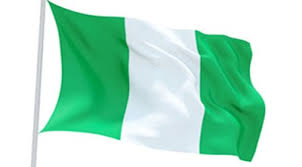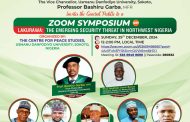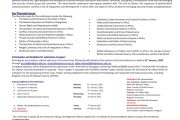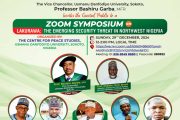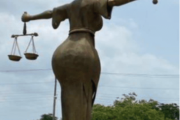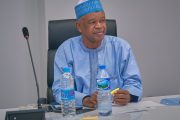Beyond the Social Media in Nigeria’s Hate Speech Prevalence (Part 2): The Northern Island Approach
The first part of this report looked at three major perspectives on the context of rising hate speech phenomenon in Nigeria. These were ‘The Geopolitical Context’, ‘The Harvest of Conflicts’ thesis and ‘The Leadership Gap’ argument. This second and concluding part takes two more perspectives – ‘the Buhari Presidency as Explanation for Hate Speech’ argument and the ‘Political Correctness Fiasco’ stance. Drawing a dichotomy between hate speech by which the media could act as sound track for genocide and contextual factors in large scale violence such as in Rwanda might be an unhelpful distinction. Nevertheless, it remains important in looking at hate speech in Nigeria to keep in mind the question of which played a greater role in the case of Rwandan crisis: the media/hate speech or the collapse of coffee price in 1989 and the subsequent misery in then a coffee dependent country such as Rwanda. Dr Ochinya Ojiji and Dr Musa Aliyu offer suggestions on how the contextual issues can be handled, with Aliyu recommending the Northern Ireland’s ‘Education for Mutual Understanding and Cultural Heritage’ model to Nigeria.
‘The Political Correctness Fiasco’ Stance
As a context underpinning rising hate speech in the media in relation to Nigeria, this is a long stance explained as follows, using the recent presidential contest in the US: Hate speeches have their day in times of misery and despair, provoked by poverty and anger, especially in an election year. It is such times that issues which the elite, with their head in the clouds, didn’t bother about, becomes central or inescapable. It creates opportunity for some people to speak the truth in an undiplomatic way. And that’s definition of hate speech. That is, people saying it as it is but in an undiplomatic manner. It was the rat the Republican candidate who though abandoned by his party smelt as to decide to abandon political correctness. He sensed what ordinary Americans felt arising from the downsides of capitalism and made them his own campaign issues. So, he could talk about building a wall on the border between the US and Mexico, stopping Muslims to whom he ascribed terrorism and such issues.

Trump, once correctly or incorrectly credited with a recolonisation of Africa for another 100 years
By concentrating thus on immigration, he was assuaging the fears, the concerns over insecurity, crime, lack of jobs. He was like saying to the voters: I know who took away your jobs. It is the Democrats through TPP/TTIP and NAFTA. Give me the votes and I know what to do. He found hate speech to be relevant on issues which have been neglected or downplayed by the requirements of niceness, political correctness when addressing consequences or the downsides of capitalism in the US/underdevelopment in the ‘Third World’. It is the same circumstance which brought up such parties as UKIP, (UK Independent Party) who are raising issues which the conservatives thought they could talk their way out until they got caught up. It is always poverty, insecurity and inequality which drive people to their base instincts. In this case, it is extreme globalisation without concern for the majority. Everywhere there is a meeting of the G-8, there is a protest.
We are back to the classical Marxian thing – the dictum that economic conditions drive the way we think, what we like, what we don’t like and how we respond to others. How do you teach people living in slums diplomacy and political correctness? Those who control the world must now worry about hunger, about diseases, about the direct and proxy wars, all of which can be wiped out if those who control the world order can, for once, respect human life. Africa can be quickly developed if they stop those wars and channel resources to human development. We must now begin to come to terms with reality and reality check. Talking about niceties won’t work just by itself.
A similarity is assumed in this analysis in terms of the economic context of the 2015 elections in Nigeria and the 2016 election in the US and how both were marked by hate speech levels described as frightening. It is an interesting analysis which suggests that hate speeches would recede once political correctness does not allow certain problems to accumulate unattended.
‘The Buhari Presidency as Explanation’ Argument

President Muhammadu Buhari: a context for rising hate speeches?
The conception of the Buhari regime as a provocation to hate speech is a thriving industry. The regime is linked with hardship, exclusionary composition of government, selectivity in its anti-corruption campaign, taking the economy into a recession, mismanagement of herdsmen violence, presumed taken over by a cabal and a host of such criticisms. As such, so it is argued, the regime has strengthened polarities along the fault lines, these being what hate expressions reflect in the (social) media. Without having to demonstrate specifically directed expressions at the regime relating to the president’s region, religion and ethnicity, the Buhari regime must be the one at the receiving end of the highest volume of hate expressions. Looking at texts, there is hardly any boundary between free and hate speeches in relation to regime. It is instructive that all two of the most known NGOs working in the area – Savannah Centre and CITAD – have been prompted into it by the degree of hate speeches they observed during the 2015 elections. Although hate speech prevalence is not measured by the quantity but the type of action implied in even one expression, both are perceived to be on the rise regarding Nigeria, mostly in the social media. The point about this context of rising hate speeches in Nigeria is not it is right or wrong but the attention it draws to a key organ of the state in explaining prevalence.
All five perspectives add up to a question: how does the society respond to the contextual foregrounding of hate speech? Dr Ochinya Ojiji, a Social Psychologist and conflict management academic at Nasarawa State University thinks the way out is to strengthen the political education of Nigerians which he thinks is too rudimentary at the moment. It is about genuine nation building such that the Nigerian takes into consideration the larger Nigeria as his or her starting point rather than himself or his small community first, he says. This is not impossible in his estimation. “When we were growing up, we were made to encounter Civics where one of the main messages was the idea of one Nigeria and we grew up with it”. in his argument, this is not simplistic because, without deliberately building such consciousness at that level, people will grow up with the natural to favour in-group at the expense of out-groups. Dr Musa Aliyu provides an empirical demonstration of Dr Ojiji’s argument by citing how the authorities in Northern Ireland and Rwanda approached the issue.
In Rwanda, says he, hate speeches were formally proscribed. Any attempt to demonise anyone else in relation to his or her identity was prohibited. Both the Rwandan and the UN system put on trial all those involved in the genocide, a process he contrasts with Nigeria in relation to Boko Haram even after the example from Nigeria Republic which speedily tried and punished people connected with violence against the state.
Delving into Northern Ireland where the fault line was Catholics versus Protestants who didn’t attend schools or markets together, lived apart and did not marry each other, Dr Aliyu explained how hate speech was attacked from the roots by building schools where the two were incentivised to attend and grow up together respecting each other. It is along the Contact Hypothesis which says that the more people who hate each other interact, the more they discover that there is hardly any basis for the hatred. This was operationalised under the Education for Mutual Understanding and Cultural Heritage which became formal in 1992. For Dr Aliyu, this is relevant to Nigeria because part of the problem Nigeria is having with the youths is that nobody has reminded those born 20 years ago that things have not always been like these. Rather, we have taught them negative peace – conception of peace as absence of violence or war rather than positive peace which makes accepting other people a central plank of socialisation. He thinks the NYSC might need being redesigned at this point in time to achieve objectives of this nature.
However, while Dr Ojiji believes that no one segment of the society is central in the process of attacking hate speech, Dr Aliyu believes the responsibility lies squarely with the state. Contrary to Dr Ojiji’s insistence that religious organisations, the civil society and the government must be involved, Dr Aliyu argues that the first step is for the Nigerian State to assure everyone that it is in charge. The state must first of all show that it is not withering away. “Now, with militancy, kidnapping, herdsmen violence and criminality everywhere, there is no confidence. The state has to come out and make it clear that Nigeria is not collapsing, that the country is not on autopilot”.
The way to do that is the promptitude in handling conflicts, an area Dr Aliyu believes the incumbent could have done better. “Why didn’t the president take all the actions he has taken now on the areas of recent violence?” In addition to promptitude is his case for material intervention in the life of the people because he is sure the situation would not be the same if many more people have jobs, food on the table and if many more people had been able to go to school.
In the first part of this report, Dr Sola Olorunyomi of the Institute for Peace and Strategic Studies of the University of Ibadan talked about a general problem with the current level of civility in Nigeria. He might have said it all. From that perspective, all the perspectives in the relationship between context and hate speech and the solutions they imply contribute something to the emergent problem. That is besides the media dimension of hate speech in a very complex Nigeria.

